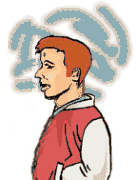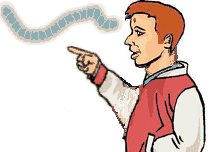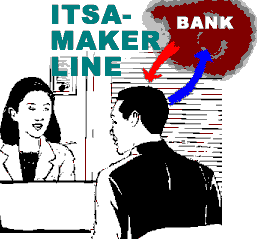Home Search Level 0 Level 1 Level 2 Level 3 Level 4 Level 4Pro Level 5 C/Sing Solo
| Tech terms | Scales | Axioms | Drills | Checksheets | Processes | Prep. lists | C/S terms | C/S tool | Grades | Cramm | Points | KTW | Online |
|
Home Search Level 0 Level 1 Level 2 Level 3 Level 4 Level 4Pro Level 5 C/Sing Solo |
|
|
| Tech terms | Scales | Axioms | Drills | Checksheets | Processes | Prep. lists | C/S terms | C/S tool | Grades | Cramm | Points | KTW | Online | |
Recall Processes
(Recalling Untraumatic and Happy Moments)
In recall processing you are making the pc communicate with his past. The normal human way to commit something to memory, is to make a mental image picture of it. Then he can later recall it (or restimulate it). In Recall you are thus having the pc communicate with mental pictures and the mental MEST stored in his mind.
There exists an elaborate recording of the past in the pc's mind. It exists with an amazing number of details and different perceptions. We call this consecutive recording of pc's existence for the Time Track.
The Time Track is like a three dimensional motion picture, but it includes recordings of emotional states, smells, motion, pains, etc., etc. It is actually complete with about 55 different perceptions. All these perceptions are recorded in mental image pictures; and put together they make up the Time Track and they can all be recalled in processing. (See also the Time Track illustrated).
Since the Reactive Mind for a large part consists of mental recordings of bad experiences, recall processes is an important step to be able to handle that. You are recalling happy experiences in this processing and that is a first important step.
 |
"When the pc gets |
When the pc gets restimulated the Bank is apparent Cause and the pc at Effect. In Recall processes the
pc is made to look at his pictures; the communication line is reversed and puts the pc at
Cause and the
Bank at Effect of the comm cycle.
|
"In Recall processes the
pc is made |
 |
This is the first important step in taking control over
the Memory Banks and the Reactive Mind. In session and under the auditor's
control the pc suddenly finds it quite doable to contact memories and mental
image pictures at will, whether known or long forgotten, and review them in
great detail in the session. The normal sequence of restimulation and "Why
did I suddenly think of that?" has been reversed and the pc + auditor is
greater than the Bank is at work. The auditor + pc team is in control and
at cause.
 |
With Recall Processes the pc |
In Recall processes we usually concentrate on positive experiences. By simply working with the mechanisms of memory and contacting the memory Banks, the pc will usually experience a considerable raise in tone as well as in recall ability. The pc will work with the mechanisms of remembering as well as forgetting. Forgetting is a mechanism of memory as well. This is clear, when you think of all the things "You would wish you could forget happened". So these are both abilities of memory and part of the Recall Grade.
Recall Grade, Quad
(Based of Filbert's Excalibur)
Quad, means four flows. The four principal flows are:
F1, FLOW 1: something happening to self. Another doing something to you.
F2, FLOW 2: doing something to another. You doing something to another.
F3, FLOW 3: others doing things to others. You see it happen as a spectator.
F0, FLOW 0: self doing something to self. You do something to yourself.
We will very briefly go over how the Recall Grade is done and what is done in it.
The Recall Grade is a part of the 0-4 Expanded Grade processes. There are about 800 processes
on 0-4, which are
mostly repetitive
processes. Sometimes processes using two commands 1, 2, 1, 2.., etc. called
alternate running.
Sometimes commands are run 1, 2, 3, 4, 5, 1, 2, 3, 4, 5, ..., this is called a
Bracket. The style used to run these processes is "Repetitive Style",
using TR-0 to TR-4 with nothing added.
If you only get "Yes" as an answer, you have to ensure what pc means.
You would of course ask, "What was it?" (Ref: Auditing
Basics).
Some advanced students of CT
think of the beginning Grades "as being a terribly easy
thing to do". We don't particularly agree with that opinion. We think that they require the most talent.
If you were to add all the processes together on the Recall Grade and all your
other Grades 0-4, you would have the 800
good rules and laws of life.
A person in very good shape has about 600 of these down cold. About 200 of these they aren't even aware of anymore and a good half dozen they have completely backwards. Most people are not in that good shape.
We are just going to go over the processes, explaining how you run them and what normally comes off. We'll just list the processes by number and letter.
Recall Processes
| 1. | Remember something. |
Repetitive to EP. |
| 2. | Recall a time. |
Repetitive to EP. |
| 3. | Recall a communication. |
Repetitive to EP. |
|
4. |
||
| F1: Tell me something you would like to confront |
Repetitive to EP. |
|
| F2: Tell me something another would like to confront |
Repetitive to EP. |
|
| F3: Tell me something others would like to confront |
Repetitive to EP. |
|
| F0: Tell me something you like to confront in yourself |
Repetitive to EP. |
You run each of those separately and individually, repetitively to EP.
Originally (4) was worded "What would you like to confront?', etc. But
the word "what" can start a listing question, meaning a question who
is designed to come up with only one basic answer (see 'Auditors Rights'). In
later materials Ron Hubbard warned against that ("Two way communication and
Listing Questions", HCOB 17 March 1974). So we take heed of that rule, although the above
commands were never officially changed. Geoffrey Filbert in his book
Excalibur Revisited has a longer explanation of why you should use "Tell
me...." rather than "What...". It all comes back to Ron Hubbard's
discovery of, asking 'What' in Two way communication can turn the process into a
Listing and Nulling action, which you don't want to do inadvertently.
In CT
we want to bring the most correct version, the version new pc's run the
best on. We have the advantage of hindsight and looking upon the processes as a
technology rather than 'a ritual according to scripture'. Any tiny differences
you will find between the official version and CT's are based on this principle
and we have found, that Filbert has been a good source to consult in these
matters.
| 4A. | Recall exhaustion. |
Repetitive to EP. |
| 5. | A. Tell me a part of your life you would be willing to re-experience. B. Tell me a part of the future you would be willing to experience. |
A, B run alternately to one EP |
[(5) was originally: "What part of your life would you be willing to re-experience?", and "What part of the future would you be willing to experience?"]
| 6. | 1. Recall something you wouldn't mind forgetting yourself. 2. Recall something you wouldn't mind another person forgetting. 3. Recall something you wouldn't mind forgetting about another. 4. Recall something you wouldn't mind another forgetting about you. 5. Recall something you wouldn't mind other people forgetting. 6. Recall s/g you wouldn't mind another person forgetting about another person. |
6-way Bracket. Run 1, 2, 3, 4, 5, 6, 1, 2, ...., etc. to one EP. |
| 7. | F1: Tell me something that it would be all right for another to make forgotten. F2: Tell me something that it would be all right for you to make forgotten. F3: Tell me something that it would be all right for others to make forgotten. F0: Tell me s/g that it would be all right for you to make forgotten about yourself. |
Repetitive to EP. Repetitive to EP. Repetitive to EP. Repetitive to EP. |
| 9. | F1: Tell me something that another would permit to have happen again. F2: Tell me something that you would permit to have happen again. F3: Tell me something that others would permit to have happen again. F0: Tell me something that you would permit to have happen to yourself again. |
Repetitive to EP. Repetitive to EP. Repetitive to EP. Repetitive to EP. |
| 10. | Recall an unconsciousness. Recall waiting. Recall a mystery. Recall sex. Recall eating. Recall a symbol. Recall thinking. Recall an effort. Recall an emotion. Recall looking. Recall knowing about. Recall not knowing. Recall knowing. |
Repetitive to EP. Repetitive to EP. Repetitive to EP. Repetitive to EP. Repetitive to EP. Repetitive to EP. Repetitive to EP. Repetitive to EP. Repetitive to EP. Repetitive to EP. Repetitive to EP. Repetitive to EP. Repetitive to EP. |
| 11. | If the pc hasn't been run on Self Analysis, it should be
done at this point. If they already have been done, the correct action
is to rehab them at this point. SAL 1 - 12 |
Each to EP or Rehab EP if already run. |
| 12. | Flow 1: 1) Recall a time that was really real to you. 2) Recall a time someone was in good communication with you. 3) Recall a time someone really felt affinity for you. 4) Recall a time another knew he/she understood you. |
Run 1, 2, 3, 4, 1, 2,..., etc., to one EP |
| Flow 2: Recall a time that was really real to another. Recall a time you were in good communication with someone. Recall a time you really felt affinity for someone. Recall a time you knew you understood someone. |
Run 1, 2, 3, 4, 1, 2,..., etc., to one EP |
|
| Flow 3: Recall a time that was really real for others. Recall a time another was in good communication with others. Recall a time another really felt affinity for others. Recall a time another knew he/she understood others. |
Run 1, 2, 3, 4, 1, 2,..., etc., to one EP |
|
| Flow 0: Recall a time you were really real to yourself. Recall a time you were in good communication with yourself. Recall a time you really felt affinity for yourself. Recall a time you knew you understood yourself. |
Run 1, 2, 3, 4, 1, 2,..., etc., to one EP |
|
| 13. | The final four processes for the level are four flows of adjustment in havingness. | |
| F1: Look around here and find something that is really real to you. F2: Look around here and find something that would be really real to another. F3: Look around here and find something that would be really real to others. F0: Look around here and find something you could make really real to yourself. |
Repetitive to EP. Repetitive to EP. Repetitive to EP. Repetitive to EP. |
Your regular Exam step is not done in session, but after C/S OK's it: Have pc read over the EPs of Recall Grade and see if he has made it:
Ability attained: "Knows he won't get any worse"
At Examiner the pc should have a Floating Needle on this: "Have you attained the ability, that you know you won't get any worse?"
End of normal processes for Recall Grade
|
RECALL RELEASE |
Knows he/she won't get worse. |
Re: Recall Grade - There do exist a compilation of all applicable processes developed by Ron Hubbard for this Grade. They are published as HCOB of 14 November 1987. In the rare case, the pc does not make it on the processes included, the correct action would be: Go over the reports of auditing already done on the Grade (do a folder error summary). Interview pc about the difficulty. Handle any By-passed Charge (including missed earlier actions as needed). Correct anything found and flatten unflat processes. If necessary, use additional processes not run, including processes for the Grade from above HCOB.
|
Home Search Level 0 Level 1 Level 2 Level 3 Level 4 Level 4Pro Level 5 C/Sing Solo |
|
|
| Tech terms | Scales | Axioms | Drills | Checksheets | Processes | Prep. lists | C/S terms | C/S tool | Grades | Cramm | Points | KTW | Online | |